Syrian Refugees in Headwaters
Each Syrian refugee settling in the hills arrives with hope for a safer life. Here we meet some of them, along with the locals who are lending hands – and hearts.
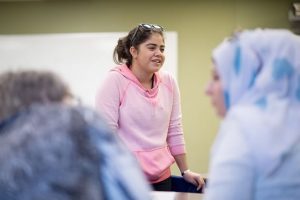
Helin Huseyin Allosh, a 16-year-old high school student living in Shelburne with her family, attends English as a Second Language classes at the Alliston Learning Centre and often helps translate for other Syrians. Photo by James MacDonald.
Helin Huseyin Allosh arrived in Shelburne in February with little English. Today, the bubbly 16-year-old wearing a pink hoodie and an irrepressible smile is confident in her new language skills.
“I speak Arabic, Turkish, Kurdish and now English,” says the Orangeville high school student with well-earned pride during a recent English as a Second Language (ESL) class.
Originally from Damascus, Helin arrived here with her parents, Sabah Abdulkadir and Khaleel Huseyin Allosh, after a lengthy and perilous journey via a refugee camp in Turkey. Helin serves as my Arabic interpreter during a visit to the Alliston Learning Centre.
Despite language barriers, the courage and open spirit of the five families I meet today is humbling. First I meet Nadi Homa and her daughter Kamilia, 13. Nadi, her husband Joseph Talia, and their four children arrived in Alliston without a sponsor, but they have been informally adopted by a group that includes the teacher leading this class, Yvonne Konrad, a fierce refugee advocate with dauntless affection for her students.
“Enjoy everything. All good here,” insists Nadi. It is possible her limited vocabulary slants her rave review, but her optimism feels genuine.
As Syrian Christians, the family was targeted by the so-called Islamic State and fled to Lebanon. The couple has found work here – she in an Italian restaurant in Alliston and he with a landscaping company in Beeton. Joseph cannot afford time off work to attend these daytime ESL classes, a challenge many refugees in rural areas face, says Yvonne.
A blacksmith by trade, Mohammed Aldiri moved to Shelburne from Damascus in January with his wife Rana Amira and seven young children. He understands English questions well, but struggles to find words. Through Helin, he admits to still yearning for big city life.
After arriving nine months ago in the Mono area, another couple, architect Zak and his wife, get by without Helin’s translation. Zak shares how grateful he is to the local community. “Very happy,” he says, “because Canada has been in my dream.”
A global local story
In many ways this Alliston class is a microcosm of the Syrian refugee experience unfolding across Canada. “Mostly we’re building confidence in newcomers to interact with and become part of their new world,” says Yvonne.
Sitting here are university-educated professionals and tradespeople – all fleeing the multipronged civil war and the violence of the Syrian government, rebels and the Islamic State. There are Sunni and Kurdish Muslims, and Syrian Christians who have suffered particularly brutal persecution.
Some families are supported by a strong, eager network of private community sponsors who have signed on for a yearlong commitment and raised a minimum of $27,000 for a family of four. The sponsors rented homes for them in advance and now help with everyday needs such as filling out paperwork, babysitting, and setting up bank accounts and cell phone contracts. They arrange drives to ESL classes, shopping, doctor appointments and mosques as far away as Brampton. A few are government-sponsored families who don’t arrive with a pre-existing network.
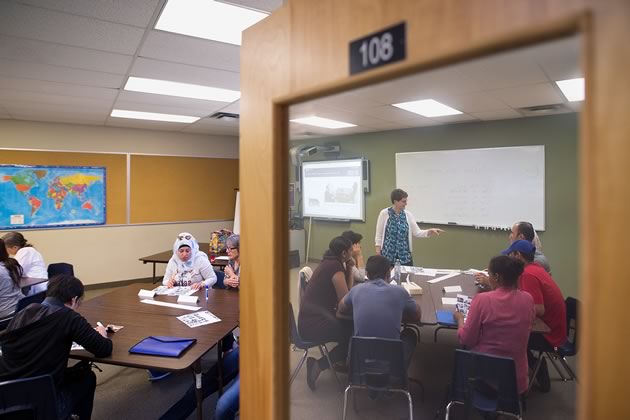
ESL instructor Yvonne Konrad leads a class in Alliston. Learning English and having a chance to practise it regularly is critical to adapting to life in Canada. Photo by James MacDonald.
All are here because the Canadian government pledged in late 2015 to accept 25,000 refugees from the five-year conflict that has killed more than 250,000 (some credible reports say more than 400,000), displaced another 6.5 million within Syria and forced 4.8 million Syrians to flee. (According to World Vision most Syrian refugees remain in the Middle East, in Turkey, Lebanon, Jordan, Iraq and Egypt, and just over 10 per cent have fled to Europe.) The population of Syria before the conflict was a little over 22 million. At press, Canada has accepted more than 33,000 refugees.
Within this global story are local tales of heartrending and vastly different refugee journeys, the distinct challenges and opportunities of rural resettlement, and a deepening understanding of our true commitment to our new neighbours.
Teaching and learning English is a cornerstone of that two-way commitment. For the Syrians who chose to make their future in Canada, this small windowless room is a crucial destination every morning. Through 30 years of teaching, Yvonne has worked with a number of immigrant and refugee communities, including a 10-year stint with Laotian newcomers who came to Canada during the “boat people” refugee migration in the 1980s. She watched them go on to get jobs, buy houses, and send their kids to university.
“People think ESL is all about language. It’s more about teaching Canadian culture, Canadian values. What we do, how we live,” explains Yvonne after class. “It’s also a safe place to ask questions, share experiences, make mistakes and connect with other newcomers who face the same challenges and fears.”
Yvonne says naturally outgoing students like Helin do very well, but many others need encouragement and chances to practise every day. Even short conversations at the grocery store and in the lineup at the bank can be helpful. She urges all of us to pitch in and try to connect with our new neighbours where we can, even when it takes us outside our comfort zones.
Without these opportunities, life for newcomers can be very lonely, particularly in the countryside, even leading to depression. “The research is clear – refugees who build a solid foundation of English earn more and integrate more successfully with their community and Canadian culture,” Yvonne says.
Making friends
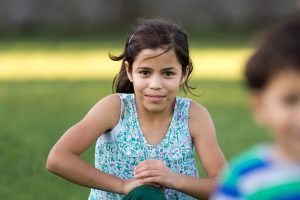
Duha Al Hariri arrived with her parents and two siblings in Orangeville via a refugee camp in Jordan this past summer. A year earlier, a bomb hit her Syrian village, killing her four-year-old brother, Basil. Duha and her brothers, Laith, 2, and Mamdouh, 11, are settling well into the area and the future is looking bright for the nine-year-old. Photo by James MacDonald.
“Picture?” I gesture with my camera at a gaggle of young kids weaving camp jewellery in the craft room of the Mansfield Outdoor Centre in early August.
Two sets of siblings here – Fatema and Hamoudi Al Haj Ali, 9 and 8, and Duha and Mamdouh Al Hariri, 9 and 11 – are members of sponsored Syrian families living in the Orangeville area. They are enjoying a week of idyllic summer camp, offered to them by camp directors Drew Gulyas and Hilary Smith.
Fatema smiles broadly. She turns to her friend Duha, the same age. Duha arrived in Orangeville from a refugee camp in Jordan in June. Hiding behind the brim of her pink ball cap, Duha wants no part of being photographed, despite Fatema’s pleas. I lower my camera.
These 2,000 acres in Mulmur, with rolling forests, horse trails, sweeping pastures, classic camp cabins and a swimming pool must feel like the moon to these young newcomers. I’m not surprised Duha shies away.
Later though, amid the crush of campers in the loud dining hall, there’s a tug on my sleeve. With Duha right behind her, Fatema asks, “A picture?” Soon both girls mug for the camera, arms draped around each other and their new camp friends – just a regular bunch of nine-year-old girls.
A little over a month later, I learn firsthand where Duha gets such strength and resilience. A year before she arrived, a bomb hit a family gathering in Duha’s Syrian village, killing her four-year-old brother, a cousin and three others. Her mother, Islam Salamah, and older brother Mamdouh spent seven months recovering in hospital.
A family’s new start
Duha’s youngest brother Laith is the kind of two-year-old who compels aunties to pinch cheeks – that is if they can catch him. Laith was a nursing infant when the bomb that killed his brother hit on June 29, 2015 – Islam shielded him from the shrapnel. I’m told he still looks up with concern outside when he hears a plane.
Today Laith plays peekaboo with the magazine’s photographer James MacDonald from behind a wall of their cozy Orangeville townhouse – home since early summer. In minutes, towering James and little Laith bond like old pals. Love emanates from this family.
We’ve been invited to visit the Al Hariri family to see how they’re adjusting. Once past the threshold, there’s no turning down an invitation to stay for dinner. From the heady aroma of the Syrian spice mix baharat wafting from the kitchen, who could resist? Islam fills our plates with fragrant rice and peas, topped with zesty vinaigrette salad. On the side there’s homemade hummus and a tangy meat pie called sfeeha.
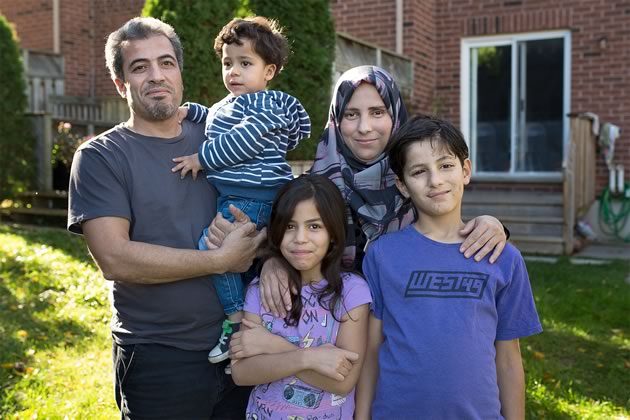
Rasmi and Islam Al Hariri are settling into life in Orangeville with their children Laith, Duha and Mamdouh. Photo by James MacDonald.
Lori Ker, a member of the group that sponsored the family, says our Iraqi translator must have been delayed. As it turns out, I may learn more about parents Islam and Rasmi without the extra help. With soccer ball in hand, Duha, Mamdouh and Laith follow Lori’s sons Kyle, 17, and Jordon, 15, outside to a nearby schoolyard. Islam moves to a seat near their back window, so I can see the garden while we chat.
What follows is a lesson in the art of broken English. There are basic rules – strip away all but nouns and the odd verb. Speak slowly, deliberately with eye contact and facial expression. Use physical aids wherever possible. That’s the easy part. The hard part is being at ease with awkward silences, to laugh at failing and just keep trying.
Like me, Rasmi lets the other two lead. Unnerved by numerous silences, I suggest to Lori that perhaps it’s time to let Islam and Rasmi get on with their evening. Both Lori and Islam read the situation perfectly. While Islam disappears to another room, Lori explains how the family comes from a close-knit community with constant visits from family and friends. She assures me our visit is no imposition. Then Islam reappears with her iPhone and tucks in beside me on the couch.
At first, the idea is to show more of her artwork, a few pieces of which we’ve noted on the walls. Islam swipes left past pencil drawings of a lamb in a meadow, a hand holding a heart, a boy sleeping on a heaven-like cloud – each strikingly innocent, hopeful.
Without pause, she moves on to pictures of family life back in Syria. They show happy gatherings – exactly the sort of impromptu shots we all take – though some of the faces are of her loved ones still in peril there. Beyond those, she shares three photos of her beautiful smiling boy Basil, who died in the blast.
“Son, Basil,” she points. “No more.” Palm down, her hand moves left and right.
Gaze straight forward, she continues, flipping to images from the hospital – fearlessly determined to show me not only the joys of everyday family life, but the brutal realities that have brought them to this living room in Orangeville.
“Islam, you are so strong,” I say, squeezing her hand. “Yes,” Islam nods. “Very strong.”
Helping hands
The sponsorship groups and scores of volunteers who have rallied over the last 18 months or more to help bring families to Headwaters are motivated by one thing – the milk of human kindness, a primal power of human connection that says we are more the same than we are different.
“It was hard to envision what that first meeting would be like,” says Brian Logel.
On December 14, 2015, the retired Orangeville educator, his wife Philomena and their sponsoring church group, the Headwaters Refugee Sponsorship Committee, were one of the first in rural Ontario to welcome a family from the new wave of Syrian refugees. Major media outlets swarmed to share the good news story of Emad and Razan Al Haj Ali and their children Fatema and Hamoudi (who were at camp with Duha and Mamdouh Al Hariri) finding a new home in Orangeville – a narrative almost two years in the making.
Even as the family approaches their first anniversary in Headwaters, the magnitude of that first airport encounter remains palpable for Brian.
“Obviously, it was very emotional,” he says, pausing as his voice trembles. “But it was also, in a sense, very ordinary. I remember thinking, ‘Well you’re here. Let’s go.’ And they did, following us, putting their complete faith in us.”
In all, the Al Haj Ali family has been followed by at least seven families across the Headwaters region who now call these hills home. Two more groups are waiting for families they’ve sponsored to be cleared to arrive (see sidebar page 42).
Like many Canadians, Lori Ker, who lives in Mono, and her co-sponsors in the New Neighbours group – including Helen Derry, and Trish and Darcy Keachie – were galvanized by the shocking image of the lifeless Syrian toddler Aylan Kurdi, who washed up on a Greek beach in early September 2015.
New Neighbours has about 30 members who have donated and raised funds, and a smaller core group who work more hands-on with practical needs. They were connected to Islam and Rasmi via a colleague of the aid worker who had connected the Headwaters Refugee Sponsorship Committee to the Al Haj Ali family.
The day-to-day reality of following through takes hard work, patience and a commitment to the long game – particularly with the more limited and far-flung resources for resettlement in the rural areas. From getting groceries to commuting, everything requires a drive and preplanning. In some cases, families can be timid about venturing out alone. “We’re working on that,” says Trish.
Lori mentions that Islam has had only the odd sideways glance in her hijab. Lori’s husband Gary worked in the Middle East for 10 years, so she understands there’s a lot of misinformation about Muslim modesty customs. She insists, “Islam is a strong mother and family leader who chooses to follow these traditions.”
Which is not to say there aren’t many cultural differences to work through. In discussing getting a driver’s licence over dinner in their home, Rasmi insists he will do the driving, as men do in Syria. Having seen so many women drive here, Islam laughs and jumps in, “Teach me to drive, not him.” Everyone joins her laughter, but they agree Islam driving would work best for getting kids to school and lessons. In rural areas without public transport, mobility is key, but so is a sense of humour in adapting to unfamiliar ways.
The rural equation
Indeed, settling in Orangeville – not to mention smaller spots like Shelburne or Alliston – is a far cry from landing in Toronto, where finding a Syrian community and getting adequate ESL access might be a lot easier.
An ESL class, for instance, must meet school board minimums (12 people in some places, 15 in others) in order to proceed and get funding – in less dense areas, the wait for a full roster can risk leaving major gaps in help for newcomers. Given the general decline in ESL funding over recent years, Yvonne says the challenges are enormous.
Many people must travel 40 minutes or more because of limited budgets for ESL classes in their own communities. Classes also often have to combine people who may be illiterate in their first language with those preparing for higher education – not ideal for either group.
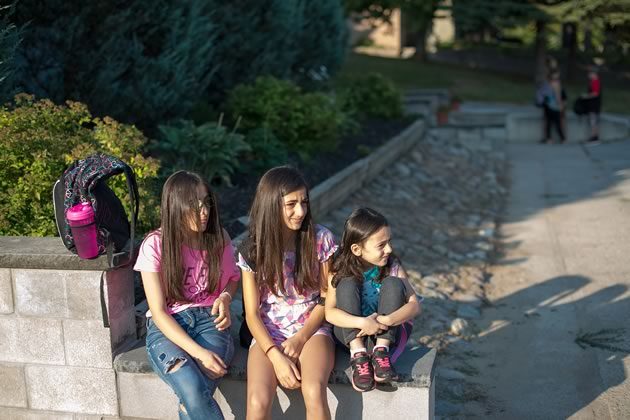
Emelia, Kamilia and Marry-Rose Talia wait for the bus on their first day of school this fall. Photo by James MacDonald.
Yvonne says both provincial and federal governments needs to revise funding rules to reflect the widely different needs of resettlement in the country and the city and allow for such accommodations as continued one-on-one instruction for those lacking basic education – especially children who may have gaps of up to five years in their education due to their family’s upheaval.
In other ways, being a visible newcomer to a small town like Orangeville has proved an advantage, sponsors and refugees say. In grocery lines, at the bank and on the street, neighbours have reached out and found ways to connect and offer their new fellow citizens jobs and goodwill. Local business people, doctors, landlords, daycare workers, camp directors and school staffs are offering what they can to help refugee families feel at home.
Duha and Mamdouh’s sponsors say Princess Margaret elementary school in Orangeville seems to be succeeding on that front. The siblings appear happy and comfortable there, and have enjoyed extra support from staff and ESL teachers. Mamdouh takes part in the regular Grade 5 program. Duha is in Grade 4 and benefits from daily help outside the classroom to help her understand assignments and work on English reading skills.
“She really likes singing the English rhymes and songs that are on the computer tablet supplied by the school board,” says one of her sponsors, Helen Derry. “For both kids, their English is improving and they are speaking in longer phrases. There’s been such a noticeable change in two short months [since school started].”
While there may be some comfort in being able to disappear into the diverse crowd of a city, small towns have other benefits, says artist Debbie Ebanks Schlums. She is part of the Creemore-based sponsorship group Out of a War Zone and Into the Hills, which supports Zak and his family. “When they first arrived, people on the street would say, ‘Welcome to Canada!’ They were shocked how nice people were, that they would welcome them,” she says.
It’s the kind of warmth that makes people want to stay. A settlement worker soon suggested the family move from Alliston to Barrie. The logic: They’re highly educated. They could get a higher level of ESL, free daycare and the independence of public transit. They said no.
“At least to start, they want to be closer to the people they know in the area,” says Debbie. “They want the social ties, even though the place is more limiting. We didn’t understand at first, but now we do.”
Most sponsors like Lori, Debbie and Brian say they feel these same bonds and are linked for life to their Syrian families beyond the mandated one-year commitment. “You get this overwhelming sense of connectivity,” says Lori, looking back on the last few months.
The power of connecting
Back in Yvonne’s class, there’s a common focus on the future that makes it easy to forget what many here have been through – bombings, siblings killed by ISIS, lost children, the unending worry of brothers, sisters, parents and others still waiting in refugee camps. The resilience of this group, and families like them across our region, is staggering.
So when school boards and governments don’t step up with sufficient and intensive ESL resources, Yvonne worries about her students – and those who aren’t able to attend classes. She can’t help but think about the depth of the trauma they’ve endured and how much is at stake for them here, in their new country.
“I find myself becoming angry at the government, at racism, at people you know who say things like ‘Why can’t they be more like us?’” she says, looking at her classroom. “Their pain is my pain now, it just is. No refugee ever thinks that they will become a refugee. No one ever thinks their country will fall apart. In Canada we would never think it could happen to us.”
I meet Khaled and Nisreen Elahmad, Muslim parents of four young children. Yvonne’s group, Refugee Rescue South Simcoe, has sponsored them since January. Khaled, who started volunteering at the ReStore in Alliston and now works at nearby Peter Thompson & Sons Lumber, is a man of few words. Indeed, my questions elicit no more than one-syllable answers, despite young Helin’s enthusiastic translations.
I don’t know Arabic, and I have scant understanding of his culture, his religion, his journey to this point. At first the communication gap feels vast. Then I think of Yvonne’s philosophy: Don’t worry about what you don’t know. Just reach out.
I lean toward Khaled, take his hand and say with a broad, warm smile and fullness of heart, “Thank you for sitting with me. Good luck to you [I point at him] and your children [signalling different heights with my hand].” Khaled’s expression melts into a smile.
And for both of us, there it is – the power of genuine human connection. Yvonne is right. It really is that simple.
More Info
What you can do
To help refugee newcomers – or those yet to come – it’s best to find out their specific needs from sponsor groups and community organizers. Some families could use information about volunteer positions as a way to get job training – or even better, don’t hold back if you have a paid job you can offer. You might consider pulling together a welcome basket for a new family in your town – or making a holiday cash donation to groups that need it.
A few places to start
Project Safe Haven
This Orangeville group is one of two in our region awaiting a Syrian family’s arrival. Matched with a family living in Jordan (related to the Orangeville family sponsored by the Headwaters Refugee Sponsorship Committee), the group has just heard the family will arrive November 28. The group has set up a rental home, but their pool of funds is diminished because they have been sending funds to Jordan to help the family while they wait. They would welcome cash donations.
contact
[email protected]
youcaring.com/projectsafehaven
Erin Refugee Action
Erin Refugee Action is waiting to be matched to one (or more) families and needs cash contributions and leads on permanent accommodation. (The group is also trying to sponsor an unaccompanied minor in a refugee camp in Greece who has family in Montreal, so they are raising funds for that too.)
contact
[email protected]
erinrefugeeaction.ca
Refugee Rescue South Simcoe
This group just on the border of Headwaters sponsored one family and informally “adopted” another who came without sponsorship, both now in Alliston. Grocery gift cards and gift cards to stores such as Winners or Giant Tiger – especially for children and teenagers – would be very welcome this holiday season. This group is also looking for cash donations toward $900 driver’s education courses for some of the parents.
contact
[email protected]
refugeerescuess.wordpress.com
First Line for Syria
This Mono-based group sponsors a Shelburne family. The family is in need of dental work, so the group is hoping for donations to help with that.
contact
Related Stories
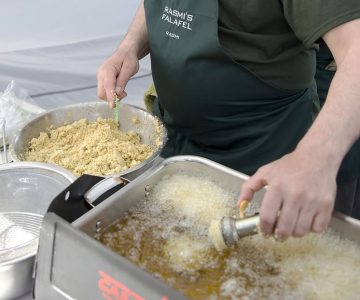
A Taste of Syria
Jun 19, 2018 | | Cooking with...Crispy chickpea fritters and zingy sides are at the heart of Rasmi’s Falafel.
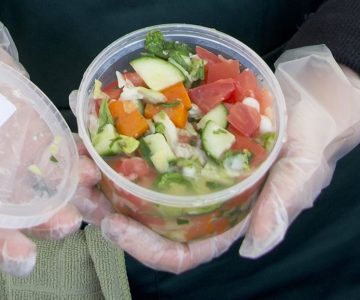
Syrian Lemon Garlic Salad
Jun 19, 2018 | | Cooking with...This zingy lemon garlic salad is a takeaway hit at Rasmi’s Falafel at the Orangeville Farmers’ Market. Here’s how to make it at home.







Wonderful touching story!
Ruth Peters from Vancouver on Nov 25, 2016 at 11:51 pm |